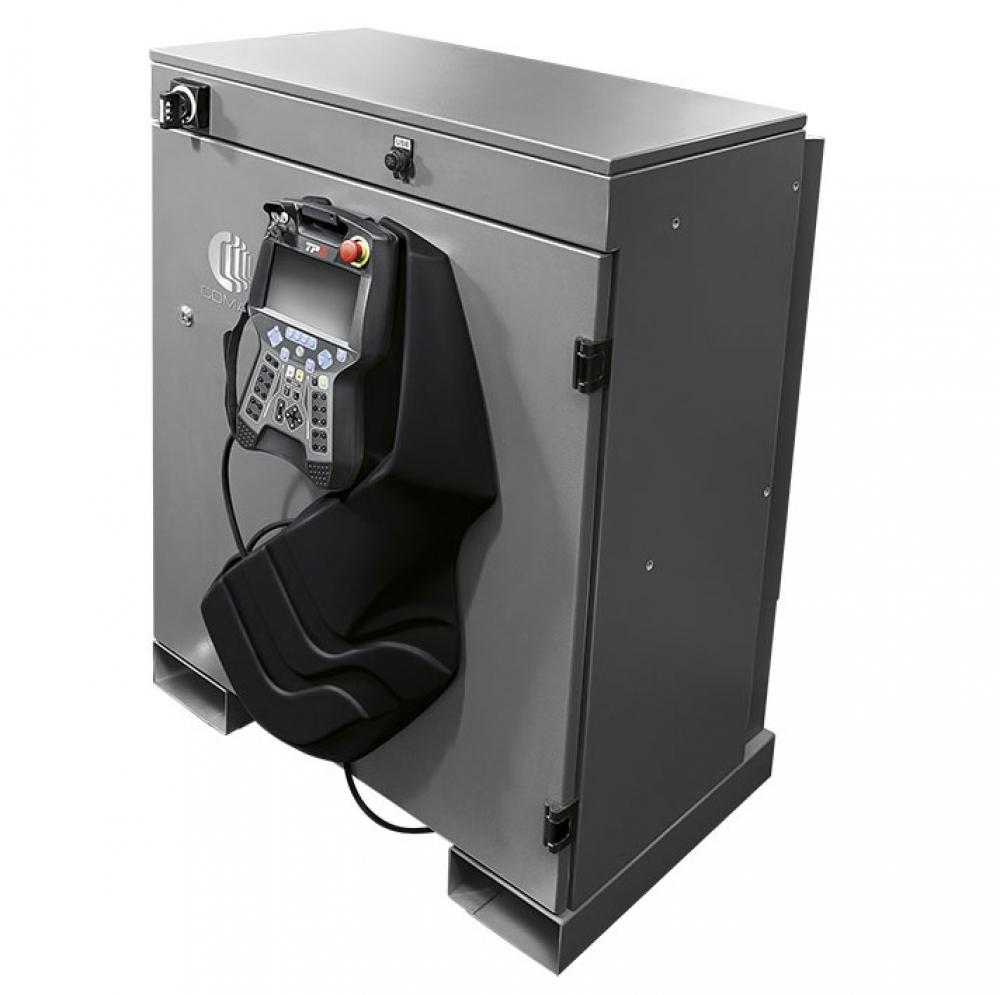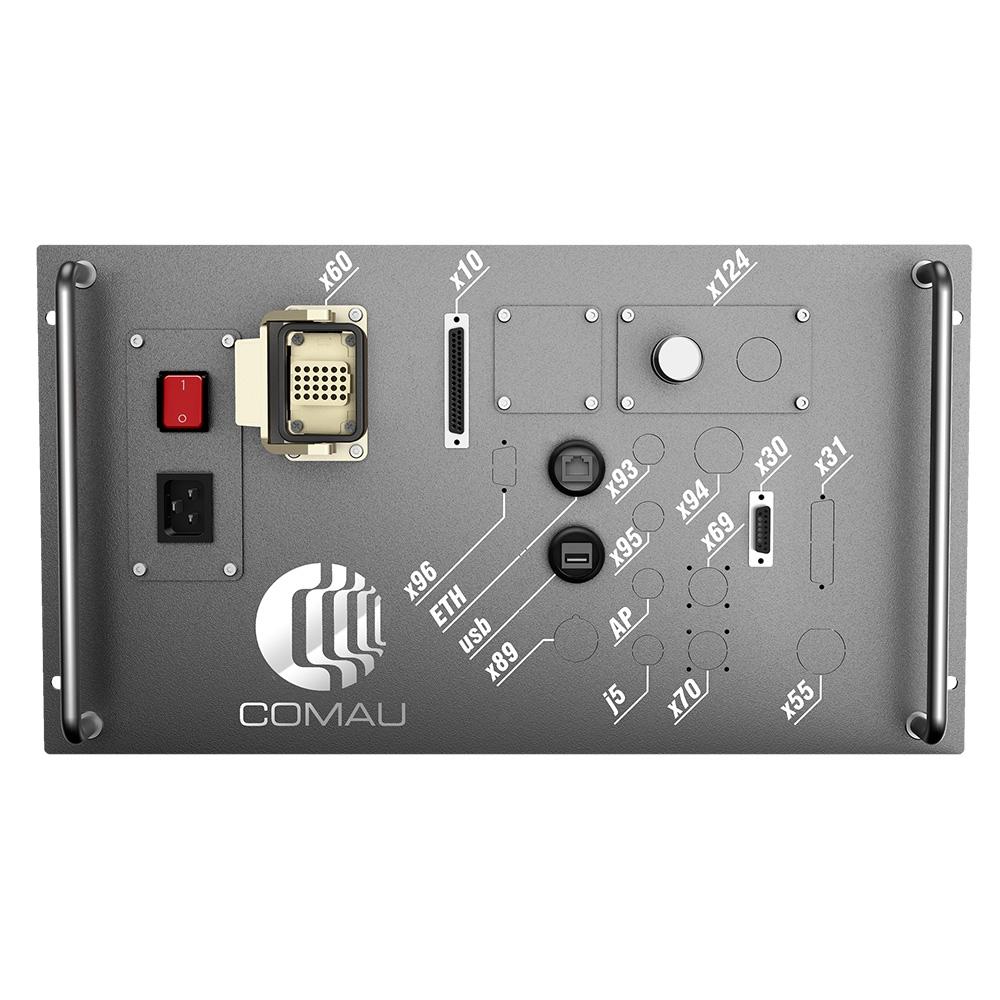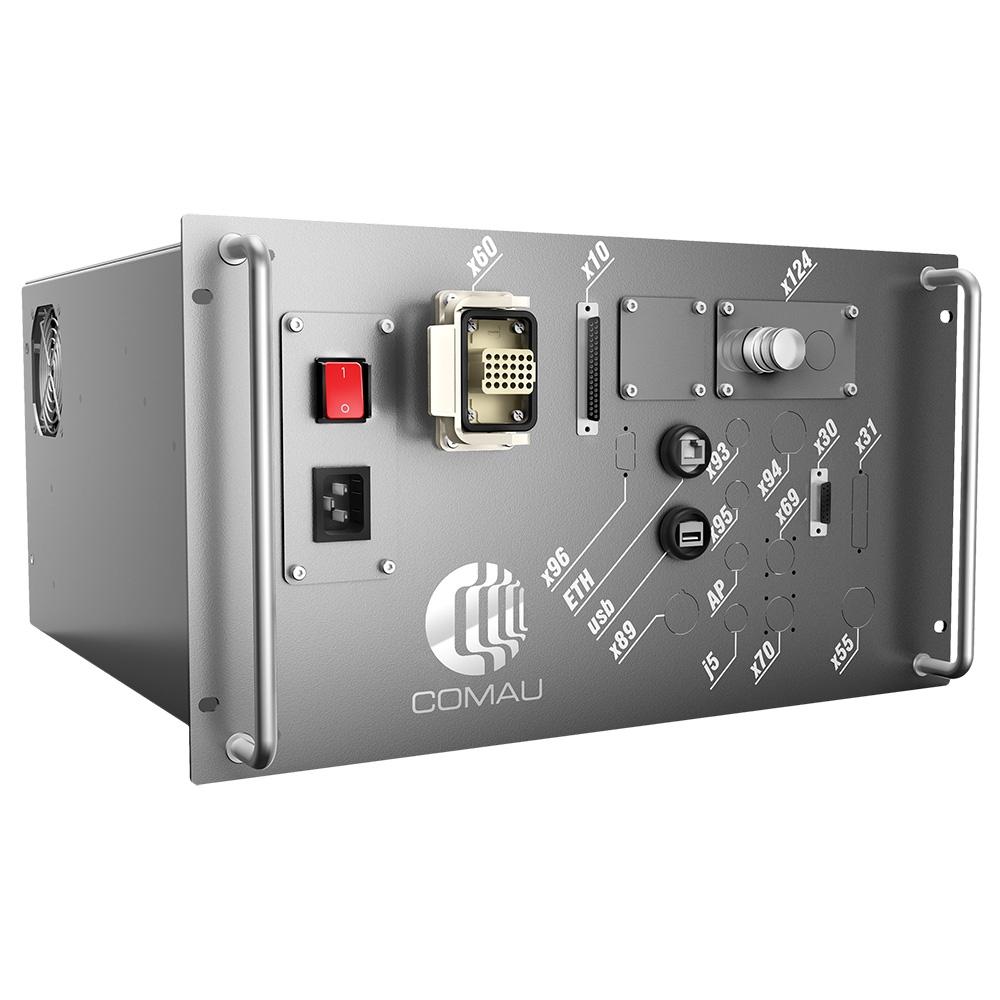Controllers - C5 Compact
High processing power
The CG5 uses the latest generation of industrial PC’s APC820 with Core2 Duo technology CPU which is capable of obtaining high performances with low energetic consumption.
Energy saving
- Lowest consumption in stand by, low consumption during operations
- Cooling system proportional to control unit’s operations
- Energy network recover system with a high dynamic content program
Flexibility and reliability
The new generation of field busses based on Hilscher technology, integrated by B&R in their remote I/O X20 family, guarantees a flexible and reliable interface in every customer application. Modular interfaces are available, such as digital I/O, analog I/O and for many kinds of position transducer encoder, resolver, etc.
RobotSAFE
Safe robot controller models allow a safety rated management of the robot motion (joint or cartesian mode) and speed through sensors, offering advanatges in terms of smaller layouts and absence of physical fences. We provide the safety of your automatic cell without affecting your productivity.
Modularity /expandibility
Modular system for drives up to 13 axes in the base cabinet function of the power, and the robot model.
Simultaneous management of several robots
Hardware architecture designed to manage up to 16 axes in “multi-arm” configuration with application box.
Case and cable
- 65% smaller than the standard version, lighter and easier to integrate
- Power saving, 50% less installed power than the standard version
- Runs up to 8 axes depending on the robot model
- Also available in safe version
- Also available in open controller version
Main technical data
- Dimensions: 550x500x550 mm
- Working temperature: 5 to 45°C
- Humidity: 90% max, no condensation
- Extended line power range: 400 to 500V
Technical specifications - C5 Compact
| Dimensions | |
| Note |
Change the installation height of the cabinet (and consequently the cut-off and control devices) in accordance with the applicable electrical standards. |
|
Weight Control unit (standard version) The weight indicated may differ depending on the configuration. Always refer to the plate posted on the Control Unit |
100 kg / 220 lb without packaging |
|
Power supply voltage
(according to EN 60204-1 § 4.3.3 standard, voltage interruption not exceeding 20 ms) |
from 400 Vac -10% to 480 Vac +10% |
| Frequency (according to EN 60204-1 § 4.3.3 standard) | 50 a 60 Hz (±2 Hz) |
| Main switch interruption power |
Standard Models 6 kA a 500 Vac North America Models 8 kA a 500 Vac Note:On C5 Compact the sectioning device is a pure isolating switch |
| Power installed | from 4 to 6 kVA |
| Auxiliary circuits power | 24 Vdc |
|
Environment conditions Cabinet protection (rear compartment excluded) (according to EN 60529 standard) |
IP 54 / NEMA 12 |
| Rear compartment protection (according to EN 60529 standard) | IP 2x |
|
Environment temperature without cooling systems (Test conditions according to EN 60068-2-14 standard) |
from +5 °C to +45 °C *2 from +41 °F a 113 °F |
|
Environment temperature with cooling systems (Test conditions according to EN 60068-2-14 standard) |
from +5 °C to +55 °C *2from +41 °F a 131 °F |
| Environment storage temperature (according to EN 60204-1 § 4.5 standard) |
from -25 °C a +55 °C from -13 °F a 131 °F +70 °C / 158 °F for periods shorter one hour |
| Maximum temperature gradient |
from -25 °C a +55 °C / from -13 °F a 131 °F - +70 °C / 158 °F for periods shorter one hour. |
|
Relative humidity
(according to EN 60204-1 § 4.4.4, test conditions HD 323.2.3. S2) |
1,5 °C/minute / 2,7 °F/minute from 5% to 95% without condensation |
| Altitude of the installation site (according to EN 60204-1 § 4.4.5 standard) | from 0 a 1.000 m / 0 to 3280 ft above mean sea level |
| Axis controlling capability |
up to 8 axes (6 basic axes, 1 additional module from 11 A, or 1 additional module double up to 5.5 A) / 6 axes |
| Cooling Standard cabin model | Natural convention |
| Drive command | Forced air recirculation |
| Vibrations and crashes |
Frequency 10 - 250 Hz 0.6 g rms axis Z |
| Sine vibration (according to EN 60068-2-64 standard) | acceleration 0.2 g rms axes X-Y acceleration |



